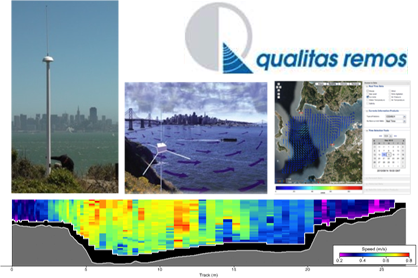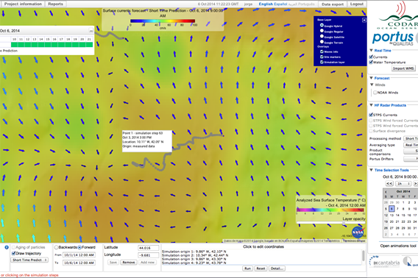The future of fight against marine pollution
 Five million tonnes of oil are dumped every year in the oceans. Having all the facts before taking action can mean the difference between a safe sea activity and an environmental disaster. For that reason, a small Spanish engineering company is developing, with the EEA Grants help, a new generation system for optimized decision making in preventing and fighting marine pollution.
Five million tonnes of oil are dumped every year in the oceans. Having all the facts before taking action can mean the difference between a safe sea activity and an environmental disaster. For that reason, a small Spanish engineering company is developing, with the EEA Grants help, a new generation system for optimized decision making in preventing and fighting marine pollution.
14.10.2014
The ocean currents are like the winds in the atmosphere, moving things from one place to another. They carry nutrients as well as water pollutants, so it is crucial to know this currents for economic and environmental reasons. Until now, for predicting the motion of the sea currents, standard models have been used. Then, the High Frequency Radar Technology arrived –especially used in USA- and a shift took place from standard models to the real-time data, which provides greater accuracy to the forecasts. The project of the Spanish company Qualitas Instruments, selected in the first Open Call of the EEA Grants Environment and Climate Change Programme, operated by CDTI, is a step towards the new generation of ocean tools to support decision-making at sea. The Environmental Hydraulic Foundation Institute University of Cantabria is project partner, doing an analysis of the necessary modifications, and complex developments in an oil transportation simulation model (called TESEO) to support HF radar information.
 The project will develop innovative added value products and technologies for decision taking in the oil & gas industry that make use of the information provided by HF Radar technology in order to improve safety and efficiency of offshore platforms. “These tools will allow better decision making and will help to reduce the odds of an environmental accident. However, if the worst does happen, it also will help to enhance the fight against marine pollution”, explains Jorge Sánchez, Qualitas Instruments International Business Development and R&D Director. For example, this new technology will tell the experts where the oil spill will go or if it will reach the coast… So, they could make the best decision regarding the mobilization of the anti-pollution resources. Something that could have been particularly useful in disasters such as the one involving the Prestige in Spain or the massive BP oil spill in the Gulf of Mexico.
The project will develop innovative added value products and technologies for decision taking in the oil & gas industry that make use of the information provided by HF Radar technology in order to improve safety and efficiency of offshore platforms. “These tools will allow better decision making and will help to reduce the odds of an environmental accident. However, if the worst does happen, it also will help to enhance the fight against marine pollution”, explains Jorge Sánchez, Qualitas Instruments International Business Development and R&D Director. For example, this new technology will tell the experts where the oil spill will go or if it will reach the coast… So, they could make the best decision regarding the mobilization of the anti-pollution resources. Something that could have been particularly useful in disasters such as the one involving the Prestige in Spain or the massive BP oil spill in the Gulf of Mexico.
So far, the project is being developed in two pilot areas: the Spanish region of Galicia, with 4 radar stations, and the north of Scotland. The final outcome: a web software which integrates the state-of-the-art ocean prediction data. It promises to be a ground-breaking progress in the field of Operational Oceanography.
The project is focused on the oil & gas offshore industry, but it has a potentially wider use. “Imagine a person thrown from a ship during an accident, our product could forecast more precisely where the rescue team should look for, or in the fishing field, where could be the best fish stocks”, explains the project promoter.
Qualitas is a 100% Spanish company created in 2002 which offers oceanographic information systems to customers such as Spanish Ports or the main oil companies and with projects in Portugal, Italy, France, Ireland, Norway, Malta, Azerbaijan or Saudi Arabia.